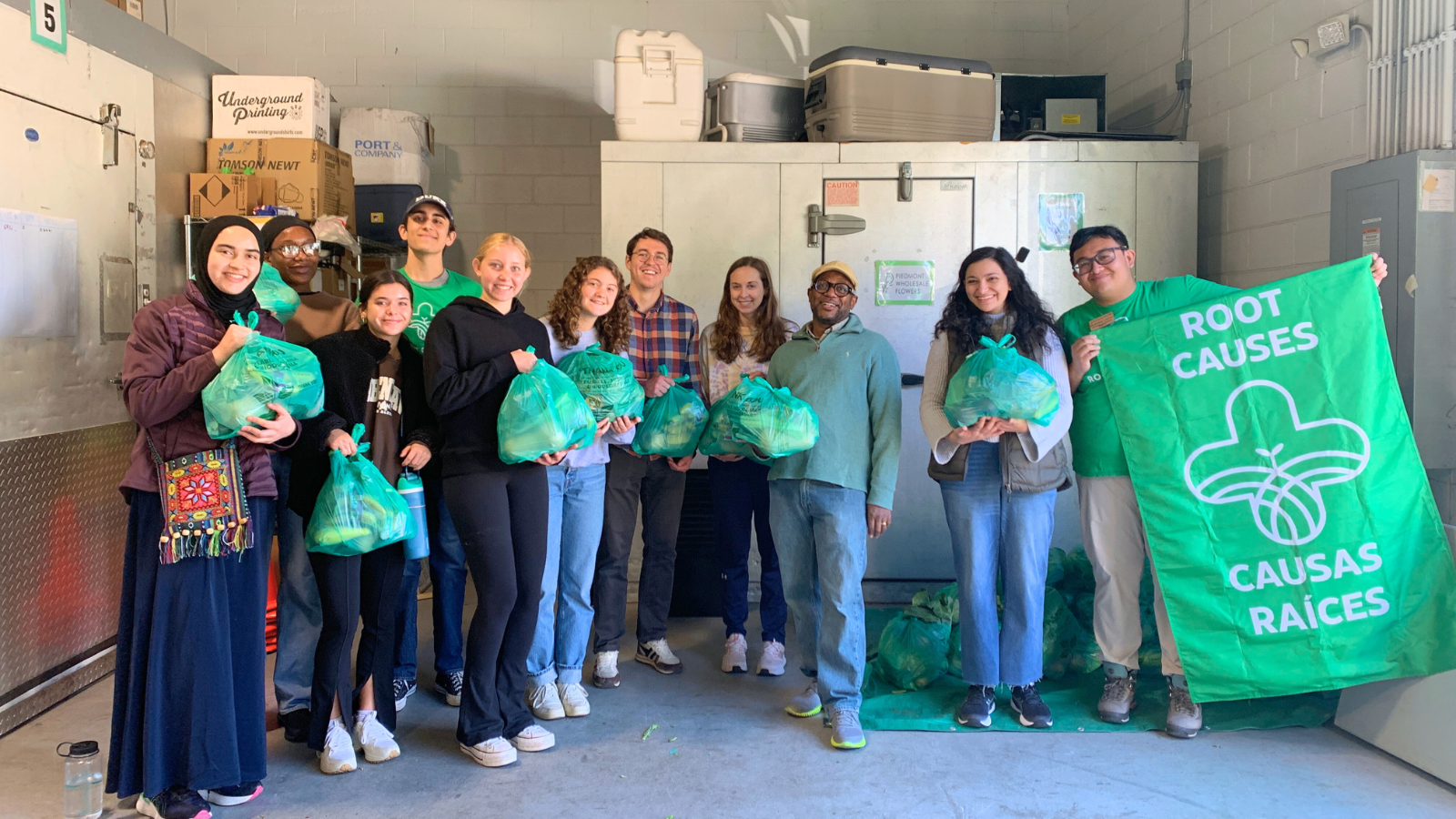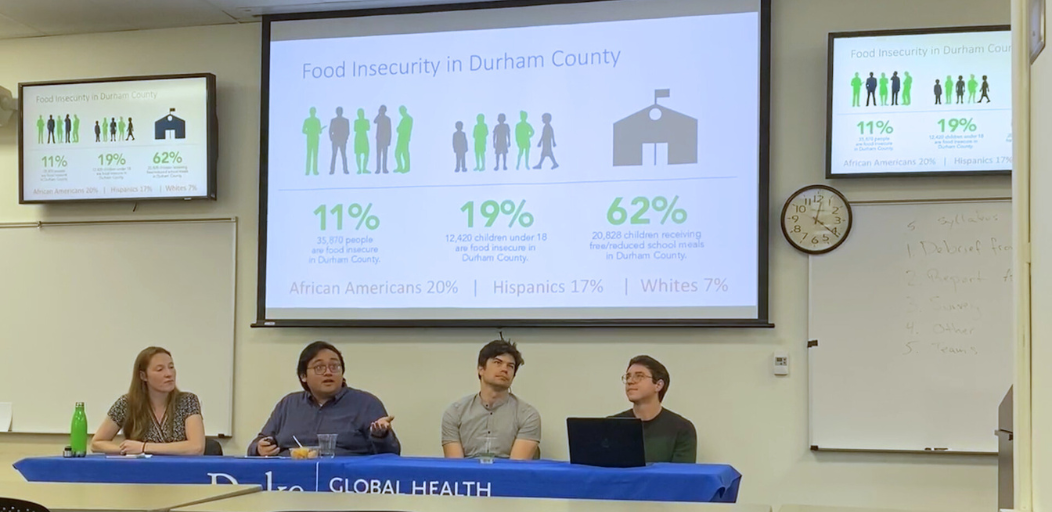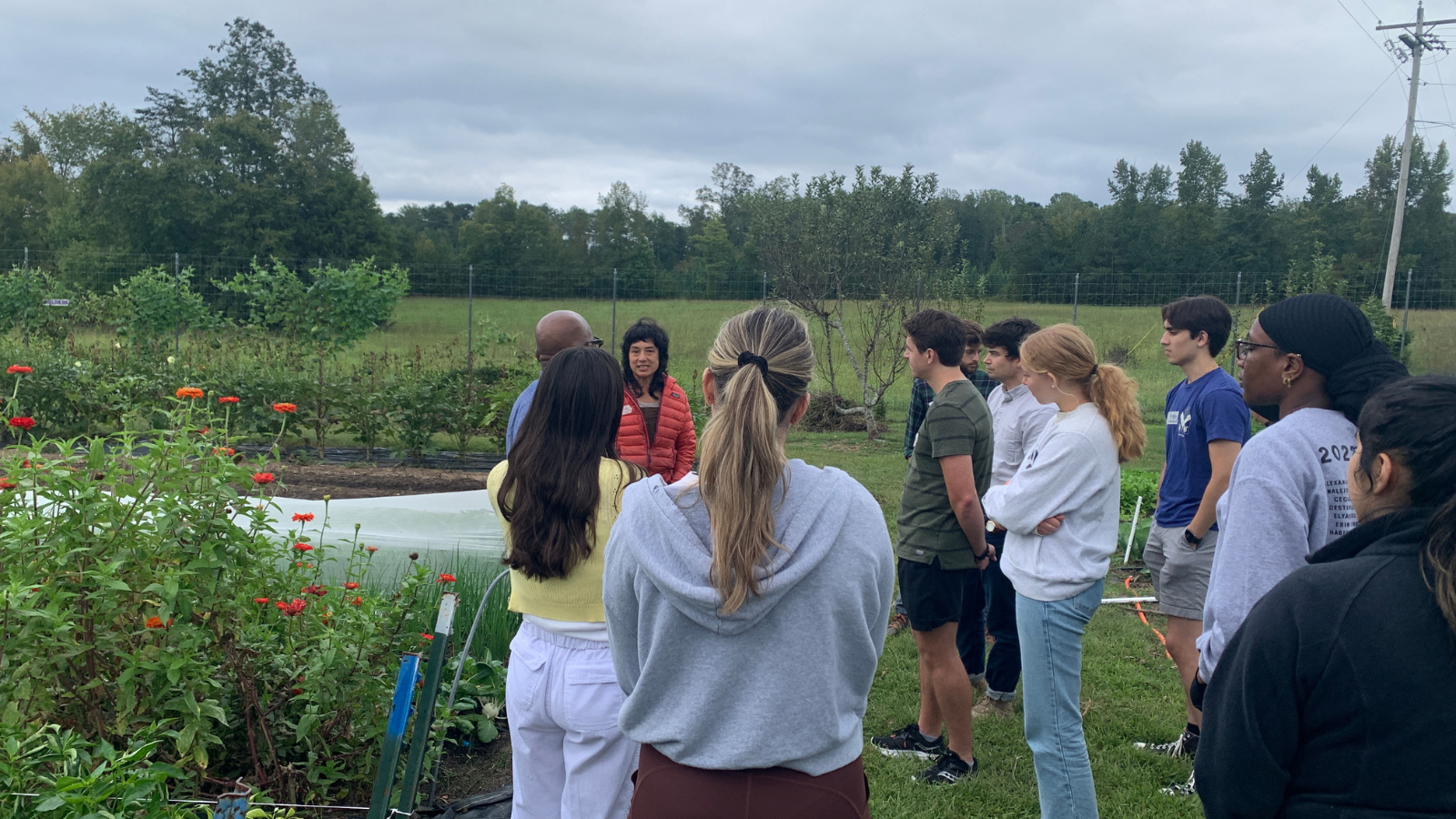Tracing the Roots of Food Insecurity in Durham
May 8, 2024

At the beginning of the COVID-19 pandemic, lockdowns and layoffs made it harder for some Durham families to put nutritious meals on the table. Knowing that access to high-quality food is one of many important social drivers of health, a group of Duke medical students expanded a program to deliver fresh produce to low-income households that were identified by local health providers.
Their program, Root Causes, was sorely needed, as food pantries also saw a spike in demand during the pandemic, serving more people than they had in years.
While programs like Root Causes expanded alongside federal programs like Special Supplemental Nutrition Program for Women, Infants and Children (WIC) and Supplemental Nutrition Assistance Program (SNAP) during the first few years of the pandemic, food insecurity in Durham has remained a critical issue.
In part, this is because the experiences of those who provide and receive food assistance have been understudied and there are critical information gaps between government programs, local organizations and the families they aim to serve.
Recognizing these disconnects, the Tracing the Roots of Nutrition Access, Implementation and Policy team, which includes faculty and students from medicine, public policy, sociology and theology, has spent the last two years untangling the network of programs aiming to increase food security and examining how their work affects Durham residents.
Examining How Residents Utilize Food Resources in Durham
To better understand the food landscape in Durham, the team works in two subteams. The first focused on unearthing the experiences of people receiving food from local organizations like Root Causes and the other focused on food access and policy impacts at the organizational level.
Doctoral student Noah Gibson (Sociology) and senior undergraduate Elaijah Lapay (Program II) lead the first subteam, which has been surveying program participants to examine how they describe their food needs; whether they are enrolled in government programs; whether they go to multiple food banks; and how they travel to food banks, and how far.
Gibson has a deep interest in food policy and is currently working on his dissertation research, which intersects with his work on the team. He feels that his involvement in the team has helped him gain on-the-ground experience that contextualizes the ideas in his dissertation and makes a difference in the lives of community residents.
“One of the really great things about this semester is the whole class has had the opportunity to talk to several different community members in Durham, from people working at the Duke Campus Farm, to leaders of food pantries, to those working in the healthcare system,” Gibson shared.

Lapay, who volunteered with Root Causes and studied food insecurity on another Bass Connections team in the midst of the pandemic, noted the importance of cultural sensitivity and the necessity of having future policy be informed by the specific ways in which food-insecure people experience the network of resources in Durham.
“Part of what we are working to understand are the underlying challenges of developing trust and understanding with communities that have been historically marginalized with regard to food insecurity and food policy,” Lapay said.
Because the needs of marginalized groups are not as well understood, the standard questions in food security screenings by healthcare providers may contribute to missing or misrepresenting residents’ needs.
“All the current food security screening questions are centered around the ability to afford food,” Lapay noted. “But how does that change for cultural communities in which people regularly share food with one another? Does it mean that you are food insecure if you don’t know exactly where your food is going to come from, though you can rely on your community to provide that for you? Does this mean we need to think in terms of access instead of affordability?”
Reexamining the underlying assumptions of the healthcare, food access and food policy communities is just one way this subteam is seeking to understand the populations that Tracing the Roots and similar organizations seek to support.
Tracing the Food Security Networks
The second subteam is investigating food policy and access at the organization level to better understand the ecosystem of food security groups in Durham. Through interviews and case study analysis team members are investigating how programs and organizations in Durham relate to each other (if at all); how well they understand local, state and federal policies and programs; whether they work to enroll participants in government programs; and what challenges they routinely face.
Subteam member Habibatou Koureichi (Public Policy ’25) noted, “Our team has found that there isn’t strong collaboration between food security organizations in Durham. They all tend to operate as separate entities.” This lack of communication between organizations can create roadblocks for knowledge and resources sharing, creating gaps that affect those who need food assistance.
This subteam is working to create materials for food-related organizations that facilitate connections and information sharing to make their programs stronger.
“Our goal is to make things easier and more concrete for nonprofit leaders,” Koureichi said. “We would like to create some type of report or network map of what organizations exist in Durham and how they work. We also want to provide recommendations on how they can utilize food policies like SNAP and WIC to expand outreach and education to their participants.”

For Koureichi, this work has helped to bridge the gap between her experience as a Duke student and that of the wider Durham community. It has also been an opportunity to expand her interest in health policy and deepen her contextual understanding of the relationship between food insecurity and health disparities.
By understanding the experiences of those who receive food assistance in Durham and those who provide it, this Bass Connections team is striving to make connections between government programs, local organizations and the families they aim to support. Ultimately, they hope that their tools and recommendations will help strengthen food systems in Durham to make them more equitable and sustainable, providing residents with high quality options for obtaining food in the community where they live.
Learn More
- Read additional profiles of Bass Connections teams.
- See highlights from the 2024 Fortin Foundation Bass Connections Showcase.
- See what students and alumni are saying about their Bass Connections experiences.
